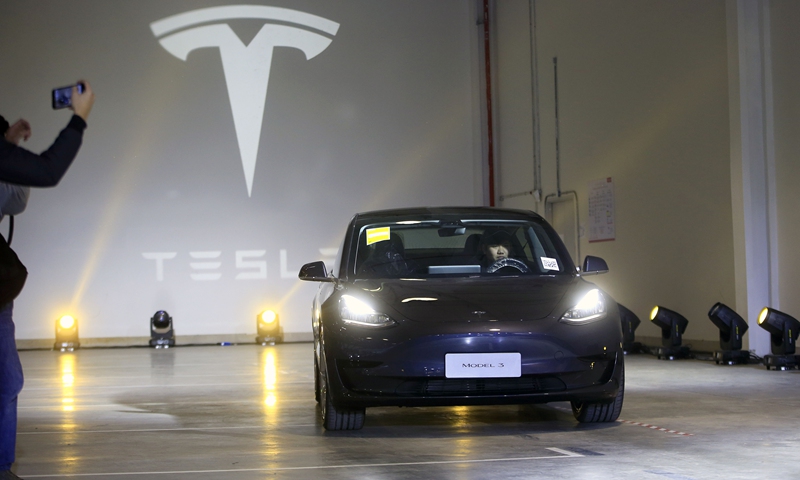
Tesla Model3
Chinese automotive analysts said on Friday that Tesla's reported plan to export Made-in-China Model 3 vehicles to Asian and European markets makes perfect sense, as it seems to be part of the US electric car firm's "build-in" China strategy.
Tesla China on Friday declined to comment on media reports that claimed the "Made-in-China" Tesla Model 3 will soon be made available to Asian and European markets when reached by the Global Times.
Earlier, Reuters reported that the global leader in pure electric cars is planning to export Model 3 cars from its Shanghai Gigafactory to Japan and the Hong Kong Special Administrative Region from next year.
Zeng Zhiling, an analyst at Shanghai-based consultancy LMC Automotives, said that such a move would make perfect sense, given various factors including the supply/demand dynamics and the plant's ownership structure.
Zeng noted that while Tesla, which started delivering Model 3 electric sedans in December 2019, is the top electric car seller in China, the Shanghai plant's designed production capacity is much larger than is needed just for the domestic market.
Tesla sold about 11,800 vehicles in the Chinese market in August, but the company aims to build 150,000 Model 3 cars in Shanghai this year, making export-oriented production possible.
Zeng said that as well as the low costs and high efficiency at the Shanghai plant, there are other factors justifying the decision to sell the cars made in China to other markets.
"Unlike most of the automotive plants in China, the Shanghai plant is solely owned by the US firm, so more sales mean more benefits for Tesla," Zeng told the Global Times, noting that concern about a Chinese partner taking some of the profit from exporting vehicles out of China has deterred many other foreign car companies in the past.
A second reason relates to Tesla's decision to build the Shanghai plant within the bonded area of the Shanghai Free Trade Zone. The unique location of the plant means imports of parts shipped from abroad and exports of assembled vehicles enjoy zero tariffs, said Zeng.
"I would say that if Tesla did not have the idea to make Shanghai an export base somewhere down the road when it chose the venue, it could have placed the plant in other areas in China that would have been more willing to offer discounts to encourage it to invest," Zeng said.
Being in the FTZ means Tesla can equip its models with locally sourced batteries for the Chinese market while retaining, according to market need, the option of using foreign batteries for models exported to other markets.
Zeng said that even for exports to Germany, where Tesla is preparing to set up a Berlin Gigafactory, the plan makes sense in that production in Germany will take some time.

